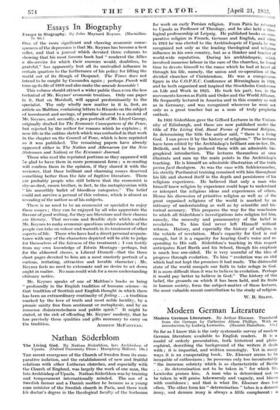Essays In Biography
ONE of the more significant and cheering economic conse- quences of the depression is that Mr. Keynes has become a best seller, and that a journal which devoted three columns to showing that his most famous book had " rendered the Allies a- dis-service for which their enemies would, doubtless, be grateful," has apparently lent all its unrivalled influence in certain quarters to the furtherance of his policy for lifting the world out of its Slough of Despond. The Times does not intend to be caught by Cassandra again ; perhaps Punch will turn up its file of 1919 and also make the amende honorable !
This volume should attract a wider public than even the less technical of Mr. Keynes' economic treatises. Only one paper in it, that on Marshall, will appeal predominantly to the specialist. The only wholly new matter in it is, first, an article on Malthus, containing letters to Ricardo 'on the subject of investment and savings, of peculiar interest to a student of Mr. Keynes, and, secondly, a /Yen portrait of Mr. Lloyd George, originally drafted for The Economic Consequences of the Peace, but rejected by-the author for lessons which he explains ; it now fills in the outline sketch which was embodied in that work in the chapter on the-Council of Four, which is here reprinted as it was published. The remaining papers have already appeared either in The Nation and Athenaeum (or the New Statesman and Nation) or the Feonomic Journal.
- Those who read the reprinted portions as they appeared will be glad to have them in more permanent form ; a re-reading will confirm them in the opinion, if they shared it -with the reviewer, that these brilliant and charming essays deserved something better than the fate of fugitive literature. There are probably people who still believe that the economist is dry-as-dust, sworn brother, in fact, to the metaphysician with ".his unearthly ballet of bloodless categories." The belief could not survive a perusal of this volume, which is almost as revealing of the author as of his subjects.
There is no need to be an economist or specialist to enjoy these essays; they can be enjoyed by all who appreciate the flavour of good writing, for they are literature and their charms are literary. That nervous and flexible style which enables Mr. Keynes to make economic questions understandable of the people can take on colour and warmth in its treatment of other aspects of life. Those who have had a direct personal acquain- tance with any of the characters depicted will be able to judge for themselves of the fairness of the treatment ; I can testify from my own knowledge of Edwin Montagu—perhaps, but for the abhorred shears, a Liberal Disraeli—that the three short pages-devoted to him are a most masterly portrait of a curious, irritating, attractive and lovable character ; Mr. Keynes feels no- need to extenuate and no desire to set down aught in malice. No man could wish for a more understanding obituary notice.
Mr. Keynes speaks of one of - Malthus's books as being " profoundly in the English tradition of humane science—in that tradition of Scottish and-English thought in which there has been an extraordinary continuity of feeling . . . a tradition marked by the- love of truth and most noble lucidity, by a prosaic sanity free from sentiment or metaphysic, and by an immense disinterestedness and public spirit." It might be stated, at the risk- of offending Mr. Keynes' modesty, that he has precisely those qualities and gifts necessary to carry on






































 Previous page
Previous page